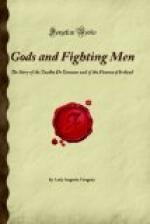Then Lugh and Balor met in the battle, and Lugh called out reproaches to him; and there was anger on Balor, and he said to the men that were with him: “Lift up my eyelid till I see this chatterer that is talking to me.” Then they raised Balor’s eyelid, but Lugh made a cast of his red spear at him, that brought the eye out through the back of his head, so that it was towards his own army it fell, and three times nine of the Fomor died when they looked at it. And if Lugh had not put out that eye when he did, the whole of Ireland would have been burned in one flash. And after this, Lugh struck his head off.
And as for Indech, son of De Domnann, he fell and was crushed in the battle, and blood burst from his mouth, and he called out for Leat Glas, his poet, as he lay there, but he was not able to help him. And then the Morrigu came into the battle, and she was heartening the Tuatha de Danaan to fight the battle well; and, as she had promised the Dagda, she took the full of her two hands of Indech’s blood, and gave it to the armies that were waiting at the ford of Unius; and it was called the Ford of Destruction from that day.
And after that it was not a battle any more, but a rout, and the Fomor were beaten back to the sea. And Lugh and his comrades were following them, and they came up with Bres, son of Elathan, and no guard with him, and he said: “It is better for you to spare my life than to kill me. And if you spare me now,” he said, “the cows of Ireland will never go dry.” “I will ask an advice about that from our wise men,” said Lugh. So he told Maeltine Mor-Brethach, of the Great Judgments, what Bres was after saying. But Maeltine said: “Do not spare him for that, for he has no power over their offspring, though he has power so long as they are living.”
Then Bres said: “If you spare me, the men of Ireland will reap a harvest of corn every quarter.” But Maeltine said: “The spring is for ploughing and sowing, and the beginning of summer for the strength of corn, and the beginning of autumn for its ripeness, and the winter for using it.”
“That does not save you,” said Lugh then to Bres. But then to make an excuse for sparing him, Lugh said: “Tell us what is the best way for the men of Ireland to plough and to sow and to reap.”
“Let their ploughing be on a Tuesday, and their casting seed into the field on a Tuesday, and their reaping on a Tuesday,” said Bres. So Lugh said that would do, and he let him go free after that.
It was in this battle Ogma found Orna, the sword of Tethra, a king of the Fomor, and he took it from its sheath and cleaned it. And when the sword was taken out of the sheath, it told all the deeds that had been done by it, for there used to be that power in swords.
And Lugh and the Dagda and Ogma followed after the Fomor, for they had brought away the Dagda’s harp with them, that was called Uaitne. And they came to a feasting-house, and in it they found Bres and his father Elathan, and there was the harp hanging on the wall. And it was in that harp the Dagda had bound the music, so that it would not sound till he would call to it. And sometimes it was called Dur-da-Bla, the Oak of Two Blossoms, and sometimes Coir-cethar-chuin, the Four-Angled Music.




